On a dramatic Thursday marked by chaos and crashes, Jack Stewart emerged victorious in Stage 5 of the prestigious Criterium du Dauphine, claiming his first World Tour victory. Riding for the Israel-Premier Tech team, Stewart showcased resilience and speed, ultimately crossing the finish line ahead of his competitors, Axel Laurance of Ineos Grenadiers and Soren Waerenskjold from Uno-X Mobility. The stage not only tested cyclists’ stamina but also their ability to navigate unexpected hurdles on the track.
Stewart’s win came as a surprising twist for his team, especially after their lead sprinter, Pascal Ackermann, had to withdraw from the race. Ackermann, who had been showing promising talent, suffered an aggravation of an existing elbow injury following a crash with approximately 50 kilometers still to cover. This incident underscored the inherent dangers of competitive cycling, where the stakes are high, and injuries can change the race’s outcome swiftly.
The day was further tarnished by multiple violent crashes that marred the racing experience. Notable among the casualties was Louis Vervaeke from Soudal Quick-Step, who tragically fractured his collarbone in one such incident. The XDS Astana team also faced setbacks with their riders, Harold Tejada and Simone Velasco. While Velasco managed to continue racing despite a fall, Tejada was not as fortunate and had to retire with a painful hand injury.
In a race filled with tension, the general classification (GC) leader, Remco Evenepoel from Soudal Quick-Step, was similarly involved in a late crash. Fortunately for the Belgian cyclist, he sustained only minor injuries, which allowed him to finish the stage unscathed and retain his lead in the overall standings. Despite the challenges, Evenepoel’s presence at the forefront of the race remained intact, highlighting his strength and determination.
The stage not only featured crashes but also contained moments of sheer panic and relief. Anthony Turgis from TotalEnergies and Lars Boven from Alpecin-Deceuninck experienced a particularly terrifying close call during the race. As they navigated a narrow road crowded with team vehicles, one of the cars made a last-minute lane switch, placing it directly in their path. Swift reflexes allowed Turgis and Boven to avoid a potentially devastating collision by veering onto the pavement just in time.
TNT Sports commentators captures this intense moment, with co-commentator Matthew Stephens emphasizing the critical nature of awareness in such high-speed scenarios. “You’ve just got to have eyes at the back of your head,” Stephens remarked, illustrating the importance of vigilance while racing. He pointed out that navigating through tight spaces is a regular hazard for cyclists, particularly in events held on winding rural roads with no clear markers indicating sharp corners or the potential for unexpected obstacles.
Fellow commentator Rob Hatch shared in the audience’s relief, suggesting everyone should take a deep breath after witnessing that near miss. “It’s easy to be shocked just watching that,” Stephens echoed, underscoring the tension that permeated the race as cyclists battled not just their competitors, but also the formidable nature of the course itself.
As Stewart celebrated his victory, he acknowledged the support of his Israel-Premier Tech teammates, paying tribute to their backing throughout the stage. The Criterium du Dauphine thus stood out as a testament to the resilience of the riders and the unpredictable nature of professional cycling, leaving fans and commentators alike on the edge of their seats. As the event draws on, the anticipation of future stages grow, revealing the intricacies and adversities faced by elite cyclists.



